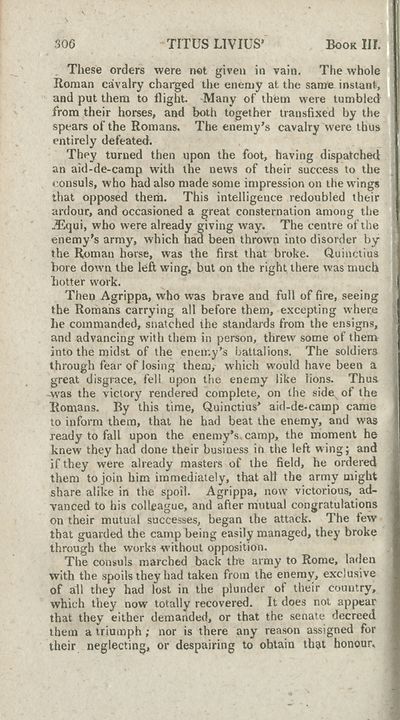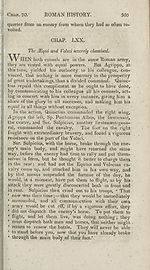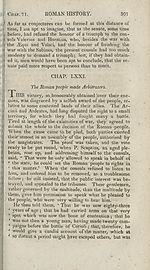Download files
Complete book:
Individual page:
Thumbnail gallery: Grid view | List view

306
TITUS LIVIUS’
Book III.
These orders were not given in vain. The whole
Roman cavalry charged the enemy at the same instant,
and put them to flight. Many of them were tumbled
from their horses, and both together transfixed by the
spears of the Romans. The enemy’s cavalry were thus
entirely defeated.
They turned then upon the foot, having dispatched
an aid-de-camp with the news of their success to the
consuls, who had also made some impression on the wings
that opposed them. This intelligence redoubled their
ardour, and occasioned a great consternation among the
JEqui, who were already giving way. The centre of the
enemy’s army, which had been thrown into disorder by
the Roman horse, was the first that broke. Quinctius
bore down the left wing, but on the right there was much
bolter work.
Then Agrippa, who was brave and full of fire, seeing
the Romans carrying all before them, excepting where
be commanded, snatched the standards from the ensigns,
and advancing with them in person, threw some of them
into the midst of the enemy’s battalions. The soldiers
through fear of losing them, which would have been a
great disgrace, fell upon the enemy like lions. Thus
was the victory rendered complete, on the side of the
Romans. By this time, Quinctius’ aid-de-camp came
to inform them, that he had beat the enemy, and was
ready to fall upon the enemy’s, camp, the moment he
knew they had done their business in the left wing; and
if they were already masters of the field, he ordered
them to join him immediately, that all the army might
share alike in the spoil. Agrippa, now victorious, ad¬
vanced to his colleague, and after mutual congratulations
on their mutual successes, began the attack. The few
that guarded the camp being easily managed, they broke
through the works without opposition.
The consuls marched back the army to Rome, laden
with the spoils they had taken from the enemy, exclusive
of all they had lost in the plunder of their country,
which they now totally recovered. It does not appear
that they either demanded, or that the senate decreed
them a triumph; nor is there any reason assigned for
their neglecting, or despairing to obtain that honour.
TITUS LIVIUS’
Book III.
These orders were not given in vain. The whole
Roman cavalry charged the enemy at the same instant,
and put them to flight. Many of them were tumbled
from their horses, and both together transfixed by the
spears of the Romans. The enemy’s cavalry were thus
entirely defeated.
They turned then upon the foot, having dispatched
an aid-de-camp with the news of their success to the
consuls, who had also made some impression on the wings
that opposed them. This intelligence redoubled their
ardour, and occasioned a great consternation among the
JEqui, who were already giving way. The centre of the
enemy’s army, which had been thrown into disorder by
the Roman horse, was the first that broke. Quinctius
bore down the left wing, but on the right there was much
bolter work.
Then Agrippa, who was brave and full of fire, seeing
the Romans carrying all before them, excepting where
be commanded, snatched the standards from the ensigns,
and advancing with them in person, threw some of them
into the midst of the enemy’s battalions. The soldiers
through fear of losing them, which would have been a
great disgrace, fell upon the enemy like lions. Thus
was the victory rendered complete, on the side of the
Romans. By this time, Quinctius’ aid-de-camp came
to inform them, that he had beat the enemy, and was
ready to fall upon the enemy’s, camp, the moment he
knew they had done their business in the left wing; and
if they were already masters of the field, he ordered
them to join him immediately, that all the army might
share alike in the spoil. Agrippa, now victorious, ad¬
vanced to his colleague, and after mutual congratulations
on their mutual successes, began the attack. The few
that guarded the camp being easily managed, they broke
through the works without opposition.
The consuls marched back the army to Rome, laden
with the spoils they had taken from the enemy, exclusive
of all they had lost in the plunder of their country,
which they now totally recovered. It does not appear
that they either demanded, or that the senate decreed
them a triumph; nor is there any reason assigned for
their neglecting, or despairing to obtain that honour.
Set display mode to:
![]() Universal Viewer |
Universal Viewer | ![]() Mirador |
Large image | Transcription
Mirador |
Large image | Transcription
| Antiquarian books of Scotland > Curiosities & wonders > Titus Livius' Roman history > (310) |
|---|
| Permanent URL | https://digital.nls.uk/115986869 |
|---|
| Description | Thousands of printed books from the Antiquarian Books of Scotland collection which dates from 1641 to the 1980s. The collection consists of 14,800 books which were published in Scotland or have a Scottish connection, e.g. through the author, printer or owner. Subjects covered include sport, education, diseases, adventure, occupations, Jacobites, politics and religion. Among the 29 languages represented are English, Gaelic, Italian, French, Russian and Swedish. |
|---|

